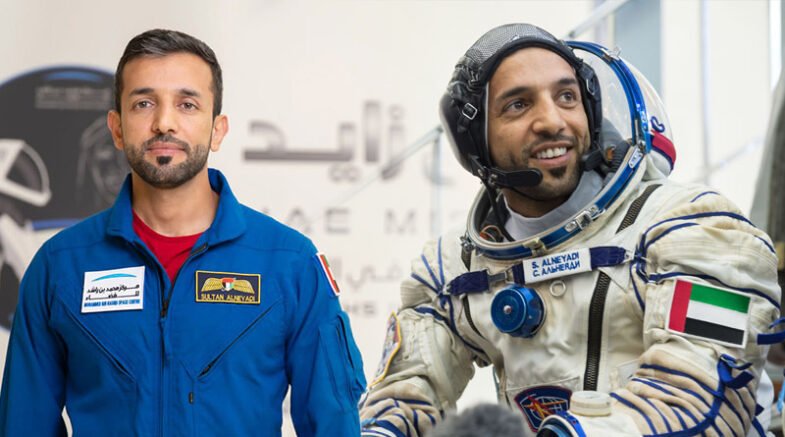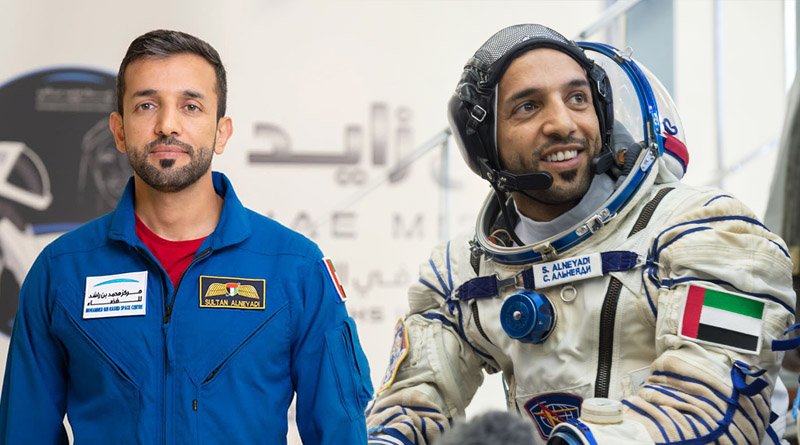AlNeyadi prepared for spacewalks by working out for more than 55 hours at NASA’s Neutral Buoyancy Laboratory (NBL) at the Johnson Space Center in Houston, Texas.

Sultan AlNeyadi will make history as the first Arab astronaut to perform a spacewalk during Expedition 69 on the International Space Station (ISS), according to a recent announcement from the Mohammed Bin Rashid Space Center (MBRSC). planned for April 28.
The UAE will carry out a spacewalk on the ISS, making it the tenth nation to do so. AlNeyadi will take part in the 262nd spacewalk to help with space station construction, upkeep, and improvements.
Spacewalk candidates are put through a rigorous selection process based on their knowledge, experience, and capacity to adapt to the harsh conditions of space. They must exhibit exceptional skill in a variety of subjects, including engineering, robotics, and life support systems, as well as superior physical and mental toughness.
The capabilities of the orbiting laboratory must be maintained, upgraded, and improved through spacewalks on the ISS.
They enable astronauts to carry out tasks like the upkeep and repair of crucial systems, the installation of new hardware and technology, and the assembling and building of the ISS modules. With astronauts from various nations collaborating and exchanging information and resources, they also represent international cooperation.
Only a few qualified astronauts get the chance to complete spacewalks because of the high level of risk involved. The pressurised resistance of the suit makes the EVA process physically demanding, but it is also mentally taxing because astronauts must concentrate on their work as well as their safety, use a plethora of potential tools, and interact with the crew and the team at mission control.
AlNeyadi prepared for spacewalks by working out for more than 55 hours at NASA‘s Neutral Buoyancy Laboratory (NBL) at the Johnson Space Center in Houston, Texas.
AlNeyadi completed nine six-hour-long runs at the NBL while training underwater to simulate spacewalks using the complete ISS mock-up.
The third spacewalk for Expedition 69 and the fifth spacewalk outside the International Space Station this year will be a historic event as NASA Flight Engineer Stephen Bowen and AlNeyadi collaborate to complete crucial tasks.
It is anticipated that the eagerly awaited EVA will last around 6.5 hours, giving the astronauts the rare chance to experience the vastness of space while working to maintain and improve the ISS. Along with showcasing their individual talents, their teamwork and collaboration will highlight the value of international cooperation in advancing human space exploration.
The primary objective of the EVA is to retrieve a crucial Radio Frequency Group (RFG) unit, which is an integral component of the ISS’s S-Band communications string. AlNeyadi and his team will also work on preparatory tasks related to the solar array installation EVAs planned for later in the mission.
The solar arrays play a pivotal role in powering the ISS, providing clean and renewable energy to support experiments, systems, and daily operations.
“Sultan AlNeyadi’s historic spacewalk is a testament to the UAE’s unwavering dedication to advancing the frontiers of space exploration and fostering international cooperation,” said Hamad Obaid AlMansoori, Chairman of MBRSC. AlNeyadi represents the aspirations of the entire region and embodies the boundless potential of our collective accomplishments as the first Arab astronaut scheduled to complete an EVA.
This accomplishment is also a physical representation of our long-term strategy to solidify the UAE’s position as a world leader in science, technology, and space while continuing to motivate the next generation to pursue knowledge and innovation assiduously.
As the first Arab astronaut scheduled to perform a spacewalk, Sultan AlNeyadi’s milestone exemplifies our dedication to leading space exploration and making a contribution to the international space community, according to Salem Humaid AlMarri, Director General of MBRSC.
This extraordinary event, which occurred during the longest Arab space mission in history, highlights the ongoing international cooperation and scientific advancements on the ISS in addition to being a significant accomplishment for the UAE and the region.
AlNeyadi recently completed one month in space after launching from Cape Canaveral in Florida with his Crew-6 team members on March 2 at 09:34 UAE time.
The crew docked with the ISS after a 25-hour flight on March 3 at 10:40 UAE time and entered the station at 12:45 UAE time on the same day. Human research activities have dominated the crew’s schedule, including ultrasound scans, vision checks, and hearing exams.
AlNeyadi participated in various activities alongside his fellow crewmates, including attaching electrodes to himself and marking veins for the Vascular Aging investigation. Bowen, Frank Rubio, and Dmitri Petelin performed eye checks on their crewmates using standard medical imaging gear.
Space physics was part of the research agenda, as scientists and engineers sought to understand how earth-created materials react to microgravity conditions. Al-Neyadi focused on cargo work, offloading 2,800 kg of science experiments, crew supplies, and station hardware.
The crew also conducted experiments such as servicing samples inside the Electrostatic Levitation Furnace and studying the dispersion of bubbles and droplets in liquids for the Foams and Emulsions experiment.
The crew will continue a number of experiments, including advancing research on 3D-cultured cardiac muscle tissue to assess human cardiac function in microgravity, testing a novel tool for deep-space immune monitoring, and examining the effects of microgravity on material combustion to improve spacecraft safety.
In addition to performing maintenance on board the ISS, AlNeyadi, the first Arab astronaut, will participate in community outreach programmes such as live calls and ham radio interactions.
The UAE Astronaut Programme is funded by the ICT Fund of the Telecommunications and Digital Government Regulatory Authority (TDRA) to support research and development in the ICT sector in the UAE and promote the country’s integration on the global stage.
